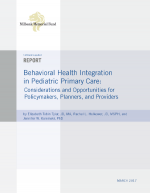Basics
Mental health in childhood means reaching developmental and emotional milestones, and learning healthy social skills and how to cope when there are problems. Mentally healthy children have a positive quality of life and can function well at home, in school, and in their communities. This website provides information about children’s mental health. Learn more about specific child mental health conditions, treatments, prevention, and public health research on children’s mental health.
What are childhood mental disorders?

Mental disorders among children are described as serious changes in the way children typically learn, behave, or handle their emotions, which cause distress and problems getting through the day.
Among the more common mental disorders that can be diagnosed in childhood are attention-deficit/hyperactivity disorder (ADHD), anxiety, and behavior disorders.
Learn more about childhood mental disorders, symptoms, and treatment.
Other childhood disorders and concerns that affect how children learn, behave, or handle their emotions can include learning and developmental disabilities, autism, and risk factors like substance use and self-harm.
Read more about related conditions.
What are the symptoms of childhood mental disorders?
Symptoms of mental disorders change over time as a child grows, and may include difficulties with how a child plays, learns, speaks, and acts or how the child handles their emotions. Symptoms often start in early childhood, although some disorders may develop during the teenage years. The diagnosis is often made in the school years and sometimes earlier. However, some children with a mental disorder may not be recognized or diagnosed as having one.
New Report:
Can childhood mental disorders be treated?
Childhood mental disorders can be treated and managed. There are many treatment options based on the best and most current medical evidence, so parents and doctors should work closely with everyone involved in the child’s treatment — teachers, coaches, therapists, and other family members. Taking advantage of all the resources available will help parents, health professionals, and educators guide the child towards success. Early diagnosis and appropriate services for children and their families can make a difference in the lives of children with mental disorders.
Get help finding treatment
If you have concerns about a child, you can use these resources to help you find a healthcare provider familiar with treatment options.
- Psychologist Locator, a service of the American Psychological Association (APA) Practice Organization.
- Child and Adolescent Psychiatrist Finder, a research tool by the American Academy of Child and Adolescent Psychiatry (AACAP).
- Find a Cognitive Behavioral Therapist, a search tool by the Association for Behavioral and Cognitive Therapies.
- If you need help finding treatment facilities, use the "Treatment Locator" widget.
Who is affected?
Childhood mental disorders affect many children and families. Boys and girls of all ages, ethnic/racial backgrounds, and living in all regions of the United States experience mental disorders. Based on the National Research Council and Institute of Medicine report that gathered findings from previous studies, it is estimated that 13 – 20 percent of children living in the United States (up to 1 out of 5 children) experience a mental disorder in a given year, and economic costs to individuals, families, and society were estimated to be $247 billion per year in 2007.
What is the impact of mental disorders in children?
Mental health is important to overall health. Mental disorders are chronic health conditions—those that go on for a long time and often don’t go away completely—that can continue through the lifespan. Without early diagnosis and treatment, children with mental disorders can have problems at home, in school, and in forming friendships. This can also interfere with their healthy development, and these problems can continue into adulthood.
Public health includes mental health
In order to help children with mental health conditions, the Centers for Disease Control and Prevention (CDC) works with partner agencies to better understand these disorders and the impact they have on children.
Read more about research on children’s mental health.
What you can do
Parents: You know your child best. Talk to your child’s healthcare professional if you have concerns about the way your child behaves at home, in school, or with friends.
Youth: It is just as important to take care of your mental health as it is to take care of your physical health. If you are angry, worried or sad, don’t be afraid to talk about your feelings and reach out to a trusted friend or adult.
Healthcare professionals: Early diagnosis and appropriate treatment based on updated guidelines are very important. There are resources available to help diagnose and treat children’s mental disorders.
Teachers/School administrators: Early identification is important so that children can get the help they need. Work with families and healthcare professionals if you have concerns about the mental health of a child in your school.
Resources
- CDC’s Child Development
- CDC’s “Learn the Signs. Act Early.” Campaign
- CDC’s Legacy for Children™
- CDC’s Mental Health
- CDC’s Positive Parenting Tips
- CDC’s Safety and Children with Disabilities
- CDC’s Youth Tobacco Prevention
- CDC’s Youth Suicide Prevention
- CDC’s Emergency Preparedness: Maintain a Healthy Mind
- CDC’s Adverse Childhood Experiences Study
- Children and Adults with Attention Deficit Disorder (CHADD)
- National Resource Center on ADHD
- SAMHSA’s Building Blocks
- Screening and Brief Intervention for Substance Use Disorders
- Tourette Association of America
- Page last reviewed: March 23, 2017
- Page last updated: March 23, 2017
- Content source:


 ShareCompartir
ShareCompartir
